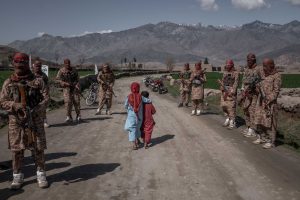In a move dripping with irony, Putin is signaling a cooperative tone with the Taliban in Afghanistan, which seized power due to an unprecedented and precipitous withdrawal of U.S. troops by the Biden Administration, leaving a dangerous power vacuum. Taking a page out of Henry Kissenger’s political realism playbook, the Russian president is looking to negotiate with the Taliban, setting the table for future cooperation. At a recent press conference with Germany’s leader Angela Merkel, Putin spoke plainly, stating, “The Taliban movement currently controls virtually the entire territory of the country, including its capital. These are realities, And we should act based on these very realities, not allowing the Afghan state’s breakup.”
Given the controversial history of the Soviet Union’s unsuccessful invasion of Afghanistan in 1979, a move that led to a nearly decade-long occupation and subsequent withdrawal of its troops, it would appear at first glance that Russia is betraying its past. However, a deeper analysis of the facts reveals that Putin was, and continues to be, a shrewd and practical politician in the region, playing the cards that are dealt to him in a cunning and economical manner.
The Middle East, which abuts Russia through a series of interconnected southern and southwestern borders, has always been an issue for Russia, mainly due to proximity, but also because of the threatening American presence, as well as concerns over Islamist-based expansions of power. However, they lacked conventional military prowess to tackle these complex, interdependent factors. As the Wilson Center, a non-partisan policy forum the explores global issues through independent research, frames it, “Moscow was motivated by the desire to prevent U.S.-backed regime change, demonstrate Russia’s great power status (to the world and to the Russian people), deepen its military foothold in the region, widen the options for Russian diplomacy, and forestall the spread of Islamist terrorism near and within Russia.”

With Biden’s colossal blunder in Afghanistan, it appears he is helping Putin check the proverbial “all of the box.” And if the reality is that Russia has been putting the pieces in place for this process for some time. Back in 2018 (which interestingly included the presence of China, Iran, Pakistan, Uzbekistan and Turkmenistan), then in early February of 2019, Russia coordinated and hosted talks with the Taliban. In doing so, Russia was likely anticipating the U.S. withdrawal of troops and preparing for any potential consequences. As ABC reported, “. . . the meeting also underlined the anxieties and political uncertainties raised by any possible U.S. pull out from Afghanistan.”
In Machiavellian-like fashion, Putin has been playing the long game, strategically stabilizing the region and creating a relationship with the potential Taliban-controlled Afghani government, all the while marginalizing U.S. interest and undermining our presence. As Army Gen. John Nicholson Jr., the top commander of U.S. forces in Afghanistan until he stepped down in July amid rumors of President Biden’s plans to leave Afghanistan, pointed out in early 2017, Russia has “begun to publicly legitimize the Taliban” and “to undermine the United States and NATO.”
Apparently, the long game is being actualized. As Kremlin envoy on Afghanistan Zamir Kabulov stated recently, “We have maintained contacts with the Taliban for the last seven years, discussing many issues. We saw them as a force that will play a leading role in Afghanistan in the future even if it doesn’t take all power. All those factors, along with guarantees given to us by the Taliban’s top leaders, give us reason for a calm view of the latest developments, although we remain vigilant.”
Kabulov, sensing the vulnerability of the current U.S. situation, which is predicated on moving forward with the American-back central Afghan government, snidely remarked, “If we compare the negotiability of the colleagues and the partners, I have long since decided that the Taliban is much more able to reach agreements than the puppet government in Kabul,” Zamir Kabulov, Russia’s presidential envoy to Afghanistan, said on state television on Monday.
Putin and his cronies, in reality, have been actively undermining Biden from the beginning of his Presidency in January. From his domination of Biden at the Geneva talks to the current quagmire that is Afghanistan, Putin has been playing him like a finely-tuned Russian fiddle. At first glance, Putin and his allies seem to extoll Biden’s virtues calling him a “professional” who is “completely knowledgeable on all issues,” complementing him as man who “does not miss a thing.”
However, a deeper examination of the Russian psyche reveals the words are being used ironically, and are part and parcel of an ongoing disinformation campaign designed to manipulate the American public via the naive if not complicit mainstream media outlets. These verbal disinformation maneuvers, known as maskirovka, are elaborate tactics, combined with doublespeak, designed around Sun Tzu’s centuries-old contention that “all warfare is based on deception.”
Liesl Schillinger, a New York-based journalist translator and expert on the Russian language, provides the following example of the use of maskirovka:
Multifront maskirovka allowed Soviet dictator Joseph Stalin’s Red Army to destroy the German 6th Army at Stalingrad in 1942 and 1943 by building false airfields and phony bridges to draw German fire (the Soviets staffed the locations with dummy soldiers to confuse reconnaissance), hiding heavy equipment with tarps, disguising an ammunition supply point as a farm village, making tanks look like hay carts, and disseminating fake news by radio, sometimes imitating German channels.
Occasionally, however, if you are perceptive enough, you can detect the subtle use of maskirovka, which was on display in June when Biden met with Putin in Geneva. In the meeting, Putin craftily employed verbal maskirovka, saying:
“So what that [Biden] sometimes confuses things. His press secretary is a young, educated, beautiful woman — she herself constantly confuses things. It is not because she is poorly educated or has a bad memory, it’s just that when people think that some things are secondary, they don’t focus too much attention on them. Americans think that nothing is more important than themselves.”
Such psychological subterfuge is characteristic of maskirovka. Like a fluid verbal dance that sweeps you of your feet while at the same time stepping on your toes, maskirovka keeps you perpetually off-balance. Schillinger, via her colleague David Shipler, the longtime Moscow correspondent for the New York Times, explains it this way: “You know I’m lying, and I know that you know, and you know that I know that you know, but I go ahead with a straight face, and you nod seriously and take notes.”
Given Biden’s questionable cognitive state, we should be listening carefully to not only what the Russians are saying, but the subtext and tone. If we don’t, we risk being played for the fool that Russians apparently think we are. And the stakes are just too high for this outcome in Afghanistan.
At Newsweed.com, we adhere to three simple principles: truth, balance, and relatability. Our articles, podcasts, and videos strive to present content in an accurate, fair, yet compelling and timely manner. We avoid pushing personal or ideological agendas because our only agenda is creating quality content for our audience, whom we are here to serve. That is why our motto is ”Rolling with the times, straining for the truth.”
Your opinion matters. Please share your thoughts in our survey so that Newsweed can better serve you.
Charles Bukowski, the Los Angeles beat poet that captured the depravity of American urban life once said, “There is something about writing poetry that brings a man close to the cliff’s edge.” Newsweed is proud to stand in solidarity and offer you a chance to get close to the cliff’s edge with our first Power of Poetry Contest. Are you a budding bard, a versatile versifier, a rhyming regaler? Do you march to the beat of iambic pentameter, or flow like a river with free verse? If so, here’s your opportunity to put your mad poetic chops to the test. Enter our poetry contest for bragging rights and an opportunity to win some cash!






